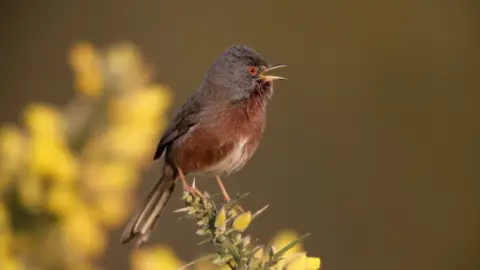Wisley: Site by M25 in Surrey to be restored to heathland
 Getty Images
Getty ImagesHeathland around the M25's busiest junction is to be restored in a project that will last 25 years, highways officials say.
National Highways will remove trees and plant more diverse vegetation on the 61 acre (25 hectare) site at Wisley and Ockham Commons, where Junction 10 of the motorway meets the A3 in Surrey.
It is hoped this will create an environment to which birds, bats, badgers, amphibians and insects will be encouraged to return.
Work is due to begin on 4 September.
Jonathan Wade, senior project manager, said: "Heathland is a diverse habitat, creating lots of homes for all kinds of animals, insects, reptiles, and birds.
"However, in the 1900s, many people didn't think heathland habitats were useful which meant vast swathes were lost to forests for timber production."
Many of the Scots pine trees which have come to dominate the landscape will be replaced with plants such as heather, bell heather, gorse, wood sage and wavy hair-grass, all of which will attract a wider variety of insect life.
 Google
GoogleThe insects will provide more food for birds, while fewer trees will allow species such as woodlarks, Dartford warblers and nightjars to nest.
Underpasses and protective netting will help amphibians, with bat boxes also being installed.
Planting around the junction, through which 300,000 vehicles a day pass, will take several years, and National Highways said it will need to monitor and manage the site for up to 25 years.

Follow BBC South East on Facebook, on Twitter, and on Instagram. Send your story ideas to southeasttoday@bbc.co.uk.
